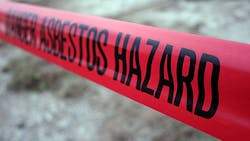Grede LLC and three individuals are named in a seven-count indictment brought by a federal grand jury, alleging the company and the individuals obstructed an investigation into workers’ exposure to asbestos at the now-closed gray and ductile iron foundry in Berlin, WI. The indictment claims that in 2012, the ferrous foundry group, its corporate safety and environmental director Peter Mark, and former employees Steven O'Connell and Christy McNamee violated the federal Clean Air Act, obstructed a federal investigation, made false statements to investigators, and engaged in conspiracy and negligent endangerment.
If convicted, the three individuals face maximum prison sentences ranging from 11 to 41 years. They also could be fined hundreds of thousands of dollars for their crimes. The foundry group faces millions of dollars in criminal penalties.
In a statement, Grede (now a holding of Metaldyne Performance Group) withheld comments on the indictment, noting the case is ongoing. "At Grede, the health and safety of our employees are always our top priority, and we strive to always follow all state and federal laws and regulations,” it stated.
Grede Holdings was formed in 2009 by investors consolidating the former Grede LLC and Citation Corp. organizations. In 2015, Grede was merged into the Metaldyne Performance Group, and in September 2016 MPG agreed to be acquired by American Axle & Manufacturing in a $1.6-billion deal.
In 2015, Grede closed the Berlin foundry.
According to the indictment, in 2012 the foundry began working to restart a heat-treating that had been out of commission for many years. One of the indicted individuals, the former plant manager Steven O’Connell, directed a supervisor to lead a crew in removing dust and insulation from the top of the oven. The work reportedly released a volume of dust into the workplace, and the workers did not have adequate protection against asbestos.
Federal law regulates the removal and handling of material suspected of containing asbestos.
The supervisor told O'Connell and corporate safety and environmental director; Christy McNamee he was worried the dust might contain asbestos, but he was told to vacuum up the material, which spread the dust further around the workplace.
One worker filed a complaint, which resulted in an inspection by a Wisconsin Department of Natural Resources. Mark and McNamee provided the inspector with a report of test results from work done on the oven, failing to report the included sample had been taken from inside the oven, not from the area where workers had been removing dust and insulation.
Later, U.S. Occupational Health and Safety inspectors were provided a report that said no asbestos was present in the sample.
Some weeks later, a state inspector returned to investigate another complaint, and collected material from the outside of the oven that tested positive for asbestos. After this visit, an email sent by Peter Mark to the other individuals confided these test results were “not good news," and directed the staff to remain quiet on the matter.
After that, Grede initiated an "asbestos training program" in which employees were told no asbestos had been disturbed in the work on the oven.
Subsequently, Grede contracted a firm to perform asbestos abatement on the site. In June 2012, OSHA issued cited Grede for workplace-safety violations committed during the oven project.
According to reports, an attorney for one of the indicted individuals claimed indictment contains some incorrect information. Without detailing the errors, the attorney promised a thorough defense of his client.
About the Author
Robert Brooks
Content Director
Robert Brooks has been a business-to-business reporter, writer, editor, and columnist for more than 20 years, specializing in the primary metal and basic manufacturing industries. His work has covered a wide range of topics, including process technology, resource development, material selection, product design, workforce development, and industrial market strategies, among others.
